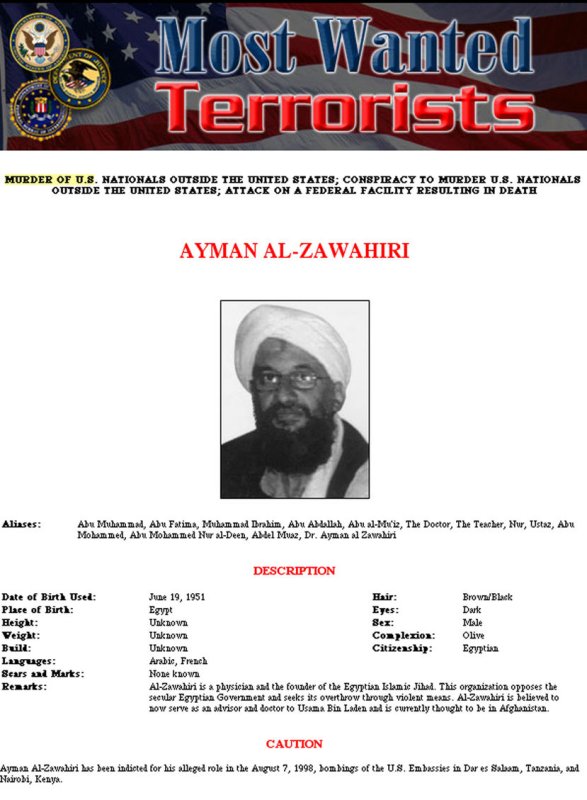Most Wanted Terrorist poster of Ayman Al-Zawahiri released by the FBI, October 10, 2001. Al-Zawahiri was named the new head of al-Qaida. cc/cc/FBI UPI |
License Photo
BEIRUT, Lebanon, June 16 (UPI) -- Al-Qaida's new leader, Ayman al-Zawahiri, faces a host of challenges in the aftermath of the assassination of Osama bin Laden -- not least of which is staying alive himself.
Since bin Laden was killed by U.S. Navy SEALs in his Pakistani hideaway May 2, ending a decade-long manhunt, two of his top lieutenants have reportedly been killed.
Mohammed Ilyas Kashmiri, a one-eyed, highly dangerous veteran of the jihads in Afghanistan, Kashmir and Pakistan, was reportedly killed in a salvo of Hellfire missiles during a U.S. drone strike June 3.
Fazul Abdullah Mohammed, bin Laden's top man in Africa and the last of the al-Qaida team that bombed U.S. embassies in Kenya and Tanzania in August 1988, perished by chance June 7 at the hands of a Somali soldier manning a checkpoint in Mogadishu.
Half a dozen other senior or mid-level operational chiefs have been killed or captured in Pakistan and elsewhere in recent weeks, part of a global operation conducted by the CIA and the U.S. military's Joint Special Operations Command to decapitate al-Qaida.
The organization hasn't had such a run of seriously bad luck for many years.
Zawahiri, a veteran Egyptian jihadist and like bin Laden the scion of a wealthy and privileged Muslim family, survived a U.S. drone strike on a house in the Baujar region of Pakistan's tribal belt in 2006 that killed 18 people.
There will no doubt be more now attempts to take out this surgeon-turned-terrorist mastermind following Thursday's announcement by al-Qaida's ruling Shura Majlis, or executive council, that he's replacing bin Laden.
Zawahiri, who will be 60 Sunday, has a $25 million U.S. bounty on his head, as did bin Laden. That's the largest reward posted by the Americans for terrorist fugitives.
Of the other nine on the current most-wanted list, seven have $5 million bounties, one has a $1 million price tag and the other $250,000.
Zawahiri, leader of Egypt's Islamic Jihad group, is believed to be hiding out in Waziristan, an Islamist stronghold in northern Pakistan.
He joined forces with bin Laden in Afghanistan in the 1980s during the war against the invading Soviets and was his deputy in al-Qaida right from the organization's formation in 1998.
But he was widely seen as the real brains and key strategist behind the jihadist network.
He lacks bin Laden's charisma but is a seasoned terrorist. He is said to be highly irascible and rigid in his thinking, impatient with those who disagree with him.
And over the years, there have been many who have crossed swords with him over strategy and operational priorities. This could undermine the al-Qaida leadership as it grapples with new geopolitical realities.
According to intelligence sources and former jihadists, Zawahiri has been criticized for showing preference for his fellow Egyptians in the organization.
Now he's in charge, he may have problems placating al-Qaida's various wings -- the Yemenis, Algerians, Iraqis, Moroccans, Libyans, Jordanians, Uzbeks, Indonesians, and increasingly these days, the Pakistanis.
Zawahiri also reportedly argued with bin Laden that the "near enemy" -- the Western-allied regimes in Muslim states like Egypt, Saudi Arabia and Jordan -- should be al-Qaida's primary focus, not the United States and the West, the "far enemy."
Whether he will reset al-Qaida's strategic objectives to concentrate on the "near enemy," particularly to counter the Arab Spring tendency toward democratic government and political moderation that has been anathema to the jihadist ideology, remains to be seen.
There are expectations that the primary focus may no longer be on hitting the United States and its allies, the central focus of bin Laden's strategy, but beefing up al-Qaida's various branches.
That includes the Yemen-based al-Qaida in the Arabian Peninsula, the most aggressive and ambitious of these affiliates.
Jason Burke, a British specialist on al-Qaida who began monitoring the jihadist network long before 9/11, noted that with bin Laden gone, "the hard core of 30 or 40 senior militants … need al-Qaida's scattered 'network of networks' more than ever.
"Several of these various 'franchises' came out in favor of Zawahiri as al-Qaida's emir very soon after the death of their leader. The choice of Zawahiri over younger figures … in part reflects their increased influence at the center."





